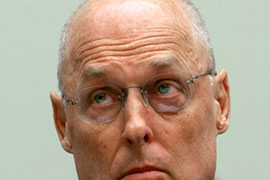US fears over mortgage giants
Stocks fall amid concerns Fannie Mae and Freddie Mac could be on verge of collapse.

The size of the mortgage giants means that any hint of trouble could have a widespread effect on the US economy.
The New York Times reported on Friday that the government was considering taking over the operations of one or both of the companies, adding to fears that have mounted this week.
‘Fundamentally sound’
However, politicians and officials from the two companies moved to reassure the market that the fears were exaggerated.
“There is sort of a panic going on today, and that’s not what ought to be. The facts don’t warrant that reaction, in my view,” Chris Dodd, the senate banking committee chairman, said.
“These institutions are … fundamentally sound and strong.”
The US congress created Fannie in 1938 and Freddie in 1970 to keep money flowing into the home loan market by buying up mortgages and bundling them into securities for sale to investors worldwide – thereby making home ownership affordable for low- and middle-income Americans.
The companies currently hold or guarantee around $5.3 trillion in home-loan debt, but under law, they are required to hold only a fraction of what is mandated for commercial banks as a financial cushion against risk.
Under a law established in 1992, if either company fell into financial trouble, the government could take over their operations by placing it in a conservatorship.
‘Adequately capitalised’
A Freddie Mac statement on Friday said that speculation around the issue of conservatorship “does not accurately reflect the facts. Freddie Mac is not on the threshold of conservatorship because we are adequately capitalised”.
Fannie Mae also defended its position saying: “As we work through this tough housing market, we are maintaining a strong capital base, building reserves for our credit losses, and generating solid revenues as our business continues to serve the market.
 |
| Paulson said the government was focusing on supporting the two firms [AFP] |
“We also have access to ample sources of liquidity, including access to the debt markets.”
Henry Paulson, the US treasury secretary, also offered no indication that there was any plan for imminent intervention.
“Today our primary focus is supporting Fannie Mae and Freddie Mac in their current form as they carry out their important mission,” he said.
Jeremy Batstone, an analyst and head of private client research at Charles Stanley stockbrokers in London, told Al Jazeera that the US government would find it difficult to bail out the companies even if it wanted to.
“The US authorities just haven’t got the money. They are as indebted as most of the US population, so there’s a crisis,” he said.
“If the main two US mortgage lenders are in meltdown then what on earth does that suggest about the health of US residential property market which of course has been in freefall for 18 months?”
Housing bill
Meanwhile, the US senate passed a bill aimed at helping thousands of Americans hang on to their homes despite the mortgage crisis.
Harry Reid, the Democratic senate majority leader, said that the bill would fund a $300 billion bailout for troubled mortgages, provide greater oversight of lenders and shore up the wider economy.
“This bill will help prevent another crisis of this magnitude, stop foreclosures before they begin and preserve for future generations the American dream of home ownership,” he said.
But some critics said that the bill would not help the underlying problems in the mortgage market, and would reward irresponsible lenders and those who took out loans beyond their means.
The measure, which passed 63-5, will now be sent back to the House of Representatives, which has already passed its own version of the legislation.
The two bills will have to be combined before being sent to George Bush, the president, to be signed into law.